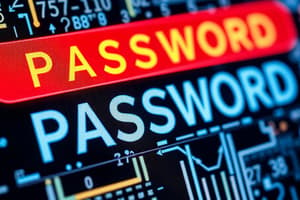Podcast
Questions and Answers
What is one of the primary purposes of a strong password?
What is one of the primary purposes of a strong password?
- To prevent phishing attacks
- To provide a first line of defense against online threats (correct)
- To be easy to remember
- To be used across multiple accounts
Using the same password for multiple accounts increases security.
Using the same password for multiple accounts increases security.
False (B)
What components should a strong password contain?
What components should a strong password contain?
A mix of letters, numbers, and special characters.
A strong password should be ________ and unpredictable.
A strong password should be ________ and unpredictable.
Match the type of threat to its description:
Match the type of threat to its description:
Which of the following is a consequence of weak passwords?
Which of the following is a consequence of weak passwords?
Strong passwords can prevent all types of phishing attacks.
Strong passwords can prevent all types of phishing attacks.
Why is it important to update your passwords regularly?
Why is it important to update your passwords regularly?
What is the minimum recommended length for a strong password?
What is the minimum recommended length for a strong password?
Using the same password for multiple accounts increases overall security.
Using the same password for multiple accounts increases overall security.
What is a passphrase?
What is a passphrase?
To improve password security, it is advisable to regularly ______ your passwords.
To improve password security, it is advisable to regularly ______ your passwords.
Match the password practices with their descriptions:
Match the password practices with their descriptions:
What is a key benefit of using a password manager?
What is a key benefit of using a password manager?
Longer passwords are easier to crack than shorter ones.
Longer passwords are easier to crack than shorter ones.
Give an example of a common weak password.
Give an example of a common weak password.
What is a characteristic of a strong password?
What is a characteristic of a strong password?
A strong password should be reused across multiple accounts for convenience.
A strong password should be reused across multiple accounts for convenience.
What should you do regularly to maintain a strong password?
What should you do regularly to maintain a strong password?
A strong password resembles a lock with multiple __________ of security.
A strong password resembles a lock with multiple __________ of security.
Match the following password strategies with their descriptions:
Match the following password strategies with their descriptions:
Which of the following would NOT provide additional strength to your password?
Which of the following would NOT provide additional strength to your password?
Creating a unique password for each account is similar to having different keys for different rooms in a house.
Creating a unique password for each account is similar to having different keys for different rooms in a house.
Give an example of a base phrase that can be used to create a strong password.
Give an example of a base phrase that can be used to create a strong password.
What is the minimum recommended length for a strong password?
What is the minimum recommended length for a strong password?
Reusing passwords across multiple accounts increases security.
Reusing passwords across multiple accounts increases security.
What should you do regularly to minimize the risk of long-term exposure?
What should you do regularly to minimize the risk of long-term exposure?
A strong password should ideally include a mix of letters, numbers, and _____.
A strong password should ideally include a mix of letters, numbers, and _____.
Match the password management steps with their descriptions:
Match the password management steps with their descriptions:
Which of the following is a method to test password strength?
Which of the following is a method to test password strength?
Using a password manager can help in maintaining strong, unique passwords.
Using a password manager can help in maintaining strong, unique passwords.
What is one example of a strong password?
What is one example of a strong password?
Which of the following accounts should specifically use strong passwords to prevent unauthorized access? (Select all that apply)
Which of the following accounts should specifically use strong passwords to prevent unauthorized access? (Select all that apply)
Weak passwords contribute to the occurrence of data breaches.
Weak passwords contribute to the occurrence of data breaches.
What can be a consequence of using weak passwords in online shopping accounts?
What can be a consequence of using weak passwords in online shopping accounts?
One way to enhance cybersecurity is by applying strong passwords to your __________ accounts.
One way to enhance cybersecurity is by applying strong passwords to your __________ accounts.
Match the following services with the importance of strong password usage:
Match the following services with the importance of strong password usage:
What is a common characteristic of weak passwords?
What is a common characteristic of weak passwords?
Using stronger passwords has no effect on safeguarding sensitive information.
Using stronger passwords has no effect on safeguarding sensitive information.
Name one way weak passwords can lead to identity theft.
Name one way weak passwords can lead to identity theft.
Flashcards are hidden until you start studying
Study Notes
Strengthening Cybersecurity Through Strong Passwords
- Fundamental Layer of Defense: Strong passwords act as the first line of defense against a wide array of online threats, safeguarding personal information, financial data, and identity.
- Preventing Hacking: Hackers utilize sophisticated tools to crack passwords. Simple passwords, such as "123456" or "password," are vulnerable and can be compromised within seconds. Strong passwords incorporating a mix of characters make it significantly harder for hackers to gain access.
- Mitigating Phishing Attacks: Phishing attacks deceive individuals into revealing their passwords by masquerading as legitimate entities. Although strong passwords cannot entirely prevent phishing, they provide an extra layer of security. Unique passwords for different sites ensure that even if one password is compromised, the security of other accounts remains intact.
- Thwarting Social Engineering: Social engineering attacks manipulate individuals into disclosing confidential information. Strong, unpredictable passwords minimize the likelihood of someone guessing your password based on personal information or social cues.
Best Practices for Robust Password Creation
- Diverse Character Mix: Combine uppercase and lowercase letters, numbers, and special symbols (@, #, $, %) to create a complex password. The greater the variety of characters, the more difficult it becomes to crack.
- Avoid Predictable Information: Refrain from using common words, readily obtainable information like your name or birthdate, or simple sequences such as "123456" or "password."
- Length Matters: Aim for passwords that are at least 12 characters long. Longer passwords increase the number of potential combinations, making them more secure.
- Unique Passwords for Each Account: Every online account should have a distinct password. If one password is compromised, it won't affect the security of other accounts.
- Consider Using Passphrases: Passphrases are sequences of random words or a sentence that are easy to remember for the user but difficult for others to guess. For example, "BlueSky@Night!2021."
- Regular Password Updates: Change passwords periodically, ideally every 3-6 months, to minimize the risk of long-term exposure.
- Utilize Password Managers: Password managers generate and store complex passwords, simplifying the process of remembering multiple strong passwords.
Analogy: Password as a Lock
- Securing Your Digital 'Home': Imagine your password as the lock on your home's door, protecting valuable possessions like personal information, financial data, and sensitive documents within.
- Strength and Complexity: Just as a robust lock has multiple mechanisms deterring intruders, a strong password incorporates a mix of uppercase and lowercase letters, numbers, and special characters to withstand hacking attempts.
- Regular Maintenance: Similar to locks requiring regular maintenance, strong passwords need periodic updates to minimize vulnerabilities.
- Multiple Keys for Different Rooms: Using unique, strong passwords for different accounts is analogous to having separate keys for various rooms in a house. Even if one key is lost, the other rooms remain secure.
Applications of Strong Passwords
- Online Banking Accounts: Safeguarding financial information from unauthorized access by using unique, complex passwords for banking and financial services accounts.
- Email Accounts: Preventing unauthorized access to email, which can lead to other compromised accounts and the disclosure of personal information.
- Social Media Profiles: Protecting social media profiles from being hijacked to prevent identity theft and misuse of personal data.
- Work and Professional Accounts: Ensuring the security of sensitive work-related data and communication through the implementation of strong passwords for professional emails, project management tools, and internal systems.
- Online Shopping Accounts: Safeguarding payment information and purchase history by securing e-commerce platform accounts with robust passwords.
- Cloud Storage Services: Protecting personal and professional files stored in the cloud from unauthorized access and data breaches.
- Subscription Services: Ensuring the security of streaming services, online courses, and other subscription accounts.
- Healthcare Portals: Protecting sensitive health information by utilizing strong passwords for accessing online healthcare services and medical records.
- Smart Home Devices: Securing smart home devices and systems like security cameras and smart locks to prevent unauthorized control and access.
- Gaming Accounts: Protecting gaming profiles and in-game purchases from being compromised using unique, strong passwords.
Consequences of Weak Passwords
- Data Breaches: Weak passwords contribute to data breaches by providing attackers with an easy entry point to gain unauthorized access to sensitive information.
- Identity Theft: A compromised password can lead to the theft of personal identity, potentially exposing individuals to financial fraud and other harmful consequences.
Step-by-Step Guide for Creating a Strong Password
- Brainstorm a Base Phrase: Choose a meaningful phrase that is not easily guessed. Example: “BlueSky at Night.”
- Add Complexity with Symbols and Numbers: Enhance the base phrase by incorporating numbers and special symbols. For example: “BlueSky@Night!2021”.
- Mix Uppercase and Lowercase Letters: Include both uppercase and lowercase letters for added security. Example: “BlueSky@Night!2021”.
- Ensure Sufficient Length: Aim for at least 12 characters or more. Example: "BlueSky@Night!2021" has 17 characters.
- Use Unique Passwords for Different Accounts: Never reuse passwords across multiple accounts. Example: "GreenSky@Morning!2021" for one account and “RedSky@Dusk!2021” for another.
- Regularly Update Passwords: Change passwords every 3-6 months to minimize long-term exposure.
- Test Password Strength: Utilize online tools like “How Secure Is My Password” to evaluate your password strength based on the time it would take a hacker to break it.
- Consider a Password Manager: Generate and store complex passwords using a password manager to simplify the process of remembering multiple strong passwords.
Studying That Suits You
Use AI to generate personalized quizzes and flashcards to suit your learning preferences.




